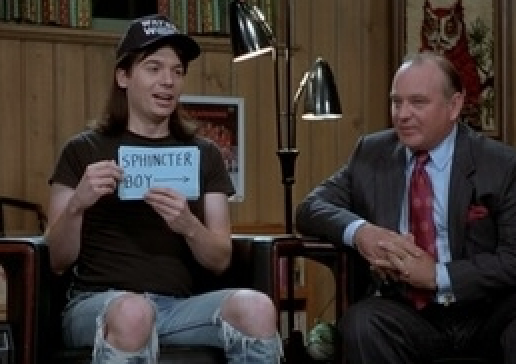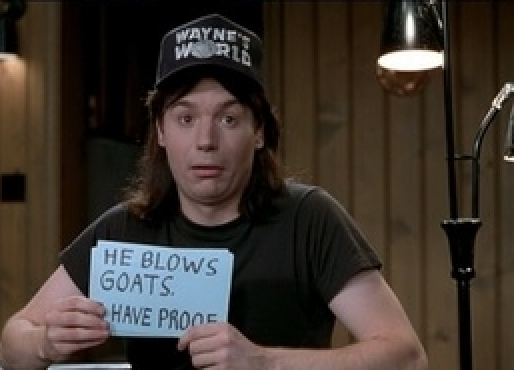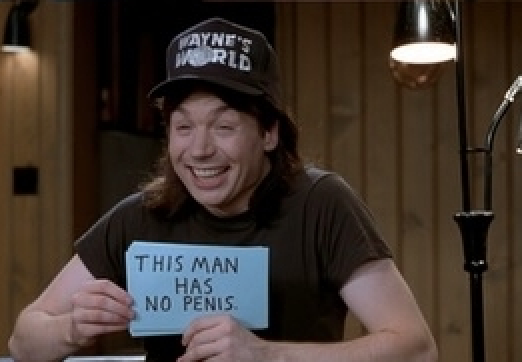Why Wayne Is The Bad Guy In His Own Movie: Wayne's World And Morality Clauses
/Wayne’s World premiered 25 years ago this month and remains a high water mark in modern comedy filmmaking, which is why I guess everyone’s been talking about it lately. I love the movie for a lot of reasons: it’s a fully realized concept, unlike a lot of SNL spinoff films, the comedy holds up on repeat viewings, and it clocks in at a lean hour and a half (I don’t know about you but I HATE the modern trend of bloated two and a half hour comedies… if you can’t say it in 90 minutes or less, you can’t say it).
To celebrate its silver anniversary, HBO has been playing it a bunch, so I’ve had the chance to rewatch it. And while the movie is good as ever, something stuck in my craw this time. Wayne (Mike Myers) is kind of the bad guy in his own film. And the skeezy TV producer Benjamin (Rob Lowe) who the film tells us is the villain is actually on the right side of things. And it’s all because of a contract dispute.
Great. Another movie ruined by being a lawyer.
So anyway, a big plot point in the film is Wayne’s reluctance to giving his show’s sponsor, Noah Vanderhoff (Brian Doyle Murray), a weekly guest spot/interview, a concession Wayne agreed to in his contract. Late in the second act, Benjamin and Wayne butt heads over this issue in what is probably one of the best modern comedy bits in recent history:
Eventually, Wayne agrees to conduct the interview with Vanderhoff, but not before writing offensive remarks on his interview cards, humiliating the sponsor on live TV. Needless to say, Benjamin isn't happy.
Benjamin: You've publicly humiliated the sponsor.
Wayne: Yeah!
Benjamin: You're fired.
Wayne: Fired? For that? Sh'yeah! Right! I'm out of here, and I'm taking my show with me.
Benjamin: We own the show.
Wayne: Aw, bite me.
Dammit Wayne! This is why you always read your contracts! And not just play-read like you did in that scene where Garth talks about sentient baby tongues.
So there’s two things going on here. First, despite Wayne’s incredulity at losing the show, it’s fairly common for a television network to buy the rights to a show they’re producing. If the creator has a lot of clout, the network will sometimes agree to license the rights instead, allowing the creator to retain ownership. But that’s exceedingly rare these days. They’d rather own it outright so they can control the property and all its ancillary revenue streams like VOD, streaming, distribution, merchandising, and spinoffs. The way the film plays it, it feels unfair (and maybe it is - how would Wayne know that giving up the rights to Wayne’s World is typical? It certainly seems that Benjamin took advantage of his inexperience), but it’s the way the business works. Wayne and Garth would’ve been smart to get a lawyer to look over the contract before signing it.
The second is whether Wayne actually breached his contract, warranting his dismissal. This is a hard call since we haven’t read his contract, but we can make some educated guesses based on the average talent agreement. While Wayne fought Benjamin on the Vanderhoff thing, he did eventually relent and conduct the interview. No one can deny that. So what gave Benjamin cause to fire him? My guess is a morality clause.
A morality clause is a provision found in certain types of employment contracts that forbids the employee from engaging in activities that may reflect badly on the employer. A violation of the clause could result in the contract being terminated. In essence, if you act like a dick and embarrass your employer, you could get fired. Word on the street was that Brian Williams was nearly let go from NBC for lying about past news reports (before being shuffled over to MSNBC) due to a morality clause in his agreement. Allegedly, that clause stated:
“If artist commits any act or becomes involved in any situation, or occurrence, which brings artist into public disrepute, contempt, scandal or ridicule, or which justifiably shocks, insults or offends a significant portion of the community, or if publicity is given to any such conduct . . . company shall have the right to terminate.”
In the movie industry, clauses like these go way back to the 1920's and 30's when the studio system wanted to exert control over movie stars’ ability to socialize, marry, and have babies, any of which - in the wrong light - could bring shame to the studio and cause box office losses. How can that be legal, you might ask? Well, it is because most stuff you contract to do is legal (outside of sex and crime), although hard to enforce and very rarely litigated on. I ran a case law search and turned up almost nothing useful for this blog post.
Knowing what kind of person Wayne was, it was likely that Benjamin would’ve inserted a morality clause into his contract. Now I know I said Wayne was wrong up top, but I’m also not saying that Benjamin is secretly the protagonist of the film. He’s definitely a sleaze ball. He manipulated Vanderhoff into sponsoring a show he wasn’t interested in, he took advantage of Wayne’s naiveté about the TV industry and allowed him to sign a contract he didn’t fully understand, and even if he wasn’t explicitly making moves on Cassandra (Tia Carrere), he did know she was dating Wayne and was spending an awful lot of time cozying up to her.
But when it comes to contracts, the law is pretty clear that Benjamin was in the right. Wayne bore the responsibility to read and understand his contract before he signed it. He then humiliated his bosses openly and brazenly. In other words, he made his choice. And it’s the choice of a new generation.
*Sips Pepsi*
Mmm! Delicious!












